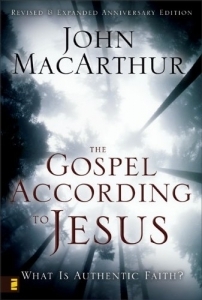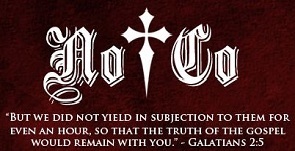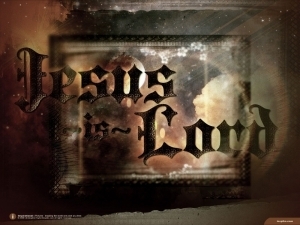Mike Abendroth's Blog, page 7
April 23, 2015
The Lordship of Christ(Part 1): Essential for Salvation
Jesus is _________. How would you fill in the blank? What is the first thing that comes to mind? Jesus is coming? He sure is. Jesus Himself promised that He will come again. Jesus is the way, the truth, and the life? That is what He told the disciples in the Upper Room. And because He is the way, the truth and the life(John 14:6), no one can come to the Father except through Him. Jesus is the Savior? That is after all the meaning of the term Jesus that the angel proclaimed.(Mathew 1:21)
Even though all those statements about Jesus are biblical truths, the one that ought to stand out above the rest is: JESUS IS LORD!
“He is called Lord(kurios in the Greek text) no less than 747 times in the New Testament. The book of Acts alone refers to Him as Lord 92 times, while calling Him Savior only twice.”
John MacArthur
Thus, we see the importance of the Lordship of Christ. And the Lordship of Christ is so important because it is essential to salvation! Essential to salvation because it is the central truth that the Scripture highlights about the person of Christ.

In His theological treatise of the gospel of God being a righteousness of God from faith(Romans 1:1, 16-17), the apostle Paul, under the inspiration of the Spirit, pens,
“…because if you confess with your mouth Jesus is Lord and believe in your heart that God raised Him from the dead, you will be saved.”
Romans 10:9(emphasis added)
Now many say that the term Lord in this passage refers to the Deity of Christ. That is true because it is inherent in its meaning. After all, no one can be saved without believing in the Deity of Christ. The apostle John makes that clear in his purpose statement when he writes,
“…but these are written so that you may believe that Jesus is the Christ, the Son of God, and that by believing you may have life in His name.”
John 20:31
But to say that the term Lord in this passage refers to the Deity of Christ, that He is God, ONLY is an incomplete and unbiblical understanding of the term. To fully understand this verse and its use of the term “Lord”, I am going to do something radical. I am going to look at the context.
“For there is no distinction between Jew and Greek, for the same Lord is Lord of all, bestowing His riches on all who call on Him.”
Romans 10:12
It is clearly obvious that Paul does not mean that Jesus is God. When Paul says He is “Lord of all”, he means He is Lord over all, both Jew and Gentile.
So the term Lord not only highlights the Deity of Christ, but also the authority and sovereignty of Christ.
Paul reinforces this.
“For what we proclaim is not ourselves, but Jesus Christ as Lord…”
2 Corinthians 4:5a
Within this context, the term Lord means Deity.
“…the gospel of the glory of Christ, who is the image of God, ”
2 Corinthians 4:4(emphasis added)
The latter part of the verse reads,
“with ourselves as your servants for Jesus’ sake”
2 Corinthians 4:5b(emphasis added)
The term translated “servants” is the Greek term “doulos”, which literally means “slave”. That is the counterpart for kurios, whose root means “rule, dominion, or power”, thus emphasising the authority of Christ as Lord and Master.
How about you? Have you embraced Jesus as Savior and yet not as Lord? If so, it is not the Jesus of the Bible, but one of your own making. If so, you are not saved, because, as we have seen, the Lordship of Christ is essential to salvation.”
“No one can say ‘Jesus is Lord’ except in the Holy Spirit.”
1 Corinthians 12:3b
April 11, 2015
Equipping Eve–What God Says About His Word
Following suit after the serpent in the garden, there is no shortage of teachers (men and women alike) willing to twist and distort God’s Word to suit their own purposes. But, what does God say about the Word He wrote? Erin explores this and more in this latest episode of Equipping Eve.
April 10, 2015
Are You Sure You Really Like Spurgeon?
 Mike reads part of an ACE article saturated with a few of Spurgeon’s sharper edges. Arminians beware.
Mike reads part of an ACE article saturated with a few of Spurgeon’s sharper edges. Arminians beware.
April 9, 2015
What I Wish People Told Me–Part 2
 Pastor Mike talks about more things he wish people told him when he was younger. Topics include the inability of religion to save you and the ultimatum that Jesus gives.
Pastor Mike talks about more things he wish people told him when he was younger. Topics include the inability of religion to save you and the ultimatum that Jesus gives.
M
What I Wish People Told Me–Part 1
April 8, 2015
It is finished! (Part 2): Redemption
When Christ said “It is finished!” (John 19:30), what exactly was finished? What was Christ referring to? What was executed or accomplished? The answer can only be found in the testimony of Scripture.
REDEMPTION – THE SIN OF BELIEVERS ATONED FOR
Redemption was an Old Testament concept.
“Say therefore to the people of Israel, ‘I am the Lord, and I will bring you out from under the burdens of the Egyptians, and I will deliver you from slavery to them, and I will redeem you with an outstretched arm and with great acts of judgment.”
Exodus 6:6
The Old Testament also talks about the kinsman-redeemer.(See Leviticus 25:25-28; Ruth 4:1-6)
Redemption is a marketplace term that has to do with a transfer of ownership by paying a purchasing price, a ransom.
The Greek term, ἀπολύτρωσιν, is derived from two Greek words ἀπο, meaning “from” and λύτρωσι, meaning liberate, free(presupposes captivity, bondage).
Thus, redemption is that Christ paid the ransom, the price of purchase, namely the giving of His life(Matt. 20:28), to liberate the sinner from bondage!
The important question is what is the sinner in bondage to that he needs to be freed from?
First, the sinner is in bondage to the Law, namely to the curse of the Law.
“For all who rely on works of the law are under a curse; for it is written, “Cursed be everyone who does not abide by all things written in the Book of the Law, and do them.”
Galatians 3:10
But here is the good news.
“Christ redeemed us from the curse of the law by becoming a curse for us—for it is written, “Cursed is everyone who is hanged on a tree.”
Galatians 3:13
The sinner is also in bondage to the law of works. That is why Paul made the statement that “if righteousness were through the law, then Christ died for no purpose.”(Galatians 2:21)
Again, Murray in his book Redemption: Accomplished and Applied, says,
“The truth expressed rests upon the recognition that the law of God has both penal sanctions and positive demands. It demands not only the full discharge of its precepts but also the infliction of penalty for all infractions and shortcomings.”
Secondly, the sinner is in bondage to sin.
“So Jesus said to the Jews who had believed him, “If you abide in my word, you are truly my disciples, 32 and you will know the truth, and the truth will set you free.” 33 They answered him, “We are offspring of Abraham and have never been enslaved to anyone. How is it that you say, ‘You will become free’?” Jesus answered them, “Truly, truly, I say to you, everyone who practices sin is a slave to sin.”
John 8:31-34
Thirdly, the sinner is in bondage to Satan.
“and they may come to their senses and escape from the snare of the devil, after being captured by him to do his will.”
2 Tim. 2:26
So, when Christ said, “It is finished!”, he meant that redemption was accomplished for His people because He paid the price of ransom, His own life, to free them from the Law, sin and Satan.
IT IS FINISHED!(Part 2): REDEMPTION
IT IS FINISHED!(Part 2): REDEMPTION
(John 19:30)
When Christ said “It is finished!”, what exactly was finished? What was Christ referring to? What was executed or accomplished? The answer can only be found in the testimony of Scripture.
REDEMPTION – THE SIN OF BELIEVERS ATONED FOR
Redemption was an Old Testament concept.
Exodus 6:6 – “Say therefore to the people of Israel, ‘I am the Lord, and I will bring you out from under the burdens of the Egyptians, and I will deliver you from slavery to them, and I will redeem you with an outstretched arm and with great acts of judgment.”
The Old Testament also talks about the kinsman-redeemer.(See Leviticus 25:25-28; Ruth 4:1-6)
Redemption is a marketplace term that has to do with a transfer of ownership by paying a purchasing price, a ransom.
The Greek term, ἀπολύτρωσιν, is derived from two Greek words ἀπο, meaning “from” and λύτρωσι, meaning liberate, free(presupposes captivity, bondage).
Thus, redemption is that Christ paid the ransom, the price of purchase, namely the giving of His life(Matt. 20:28), to liberate the sinner from bondage!
The important question is what is the sinner in bondage to that he needs to be freed from?
First, the sinner is in bondage to the Law, namely to the curse of the Law.
Galatians 3:10 – “For all who rely on works of the law are under a curse; for it is written, “Cursed be everyone who does not abide by all things written in the Book of the Law, and do them.”
But here is the good news.
Galatians 3:13 – “ Christ redeemed us from the curse of the law by becoming a curse for us—for it is written, “Cursed is everyone who is hanged on a tree.”
The sinner is also in bondage to the law of works. That is why Paul made the statement that “if righteousness were through the law, then Christ died for no purpose.”(Galatians 2:21)
Again, Murray in his book Redemption: Accomplished and Applied, says,
“The truth expressed rests upon the recognition that the law of God has both penal sanctions and positive demands. It demands not only the full discharge of its precepts but also the infliction of penalty for all infractions and shortcomings.”
Secondly, the sinner is in bondage to sin.
John 8:31-34 – “So Jesus said to the Jews who had believed him, “If you abide in my word, you are truly my disciples, 32 and you will know the truth, and the truth will set you free.” 33 They answered him, “We are offspring of Abraham and have never been enslaved to anyone. How is it that you say, ‘You will become free’?” Jesus answered them, “Truly, truly, I say to you, everyone who practices sin is a slave to sin.”
Thirdly, the sinner is in bondage to Satan.
2 Tim. 2:26 – “and they may come to their senses and escape from the snare of the devil, after being captured by him to do his will.”
So, when Christ said, “It is finished!”, he meant that redemption was accomplished for His people because He paid the price of ransom, His own life, to free them from the Law, sin and Satan.
- – Hariton Deligiannides (Head of the Elders Board at BBC)
JD Hall Interview
 JD discusses Reformation Montana, Pulpit and Pen ministries, A Voice in the Wilderness and much more.
JD discusses Reformation Montana, Pulpit and Pen ministries, A Voice in the Wilderness and much more.
April 7, 2015
Knowing The Will Of God
 What is the difference between God’s sovereign will and His revealed will? Is “Finding God’s will” a pagan notion? What about marriage and God’s “perfect” will?
What is the difference between God’s sovereign will and His revealed will? Is “Finding God’s will” a pagan notion? What about marriage and God’s “perfect” will?
April 6, 2015
It is finished! (Part 1): Propitiation
Never were such words uttered with such finality! While on the cross, Jesus did NOT say, “It MAY be finished” OR “I HOPE it is finished.” Rather, He said declaratively, “It IS finished!” (John 19:30)
Never were such depth of words spoken as our Lord spake while on the cross. Never was there so much meaning in one word. Yes, one word, τετέλεσται, translated “It is finished.”
As Arthur W. Pink wrote in his book, The Seven Sayings of the Savior on the Cross
“The ancient Greeks boasted of being able to say much in little – “to give a sea of matter in a drop of language” was regarded as the perfection of oratory. What they sought is here found. “It is finished” is but one word in the original, yet in that word is wrapped up the Gospel of God; in that word is contained the ground of the believer’s assurance; in that word is discovered the sum of all joy and the very spirit of all divine consolation.”
τετέλεσται means to bring to a close or to execute or to accomplish.
So my question is: When Christ said “It is finished!”, what exactly was finished? What was Christ referring to? What was executed or accomplished? The answer can only be found in the testimony of Scripture.
PROPITIATION – THE WRATH OF THE FATHER SATISFIED
In his book Redemption: Accomplished and Applied, John Murray wrote
“But what does propitiation mean? In the Hebrew of the Old Testament it is expressed by a word which means to “cover” (1) It is a reference to sin that the covering takes place; (2) the effect of this covering is cleansing and forgiveness; (3) it is before the Lord that both the covering and its effect take place. … It is that sin evokes the holy displeasure or wrath of God. Vengeance is the reaction of the holiness of God to sin. And the covering is that which provides for the removal of divine displeasure which the sin evokes.”
The important question is how can God remain just and at the same time justify(declare righteous) the ungodly? Paul’s answer: propitiation.
“whom God put forward as a propitiation by his blood, to be received by faith. This was to show God’s righteousness, because in his divine forbearance he had passed over former sins. 26 It was to show his righteousness at the present time, so that he might be just and the justifier of the one who has faith in Jesus.”
Romans 3:25-26
As the modern hymn In Christ Alone says
“Til on that cross as Jesus died
The wrath of God was satisfied
For every sin on Him was laid
Here in the death of Christ I live”
So, when Christ said, “It is finished!”, he meant that propitiation was accomplished because the wrath of the Father was satisfied by the substitutionary death of the Son.
IT IS FINISHED!(Part 1): PROPITIATION
IT IS FINISHED!(Part 1): PROPITIATION
(John 19:30)
Never were such words uttered with such finality! While on the cross, Jesus did NOT say, “It MAY be finished” OR “I HOPE it is finished.” Rather, He said declaratively, “It IS finished!”
Never were such depth of words spoken as our Lord spake while on the cross. Never was there so much meaning in one word. Yes, one word, τετέλεσται, translated “It is finished.”
As Arthur W. Pink wrote in his book, The Seven Sayings of the Savior on the Cross
“The ancient Greeks boasted of being able to say much in little – “to give a sea of matter in a drop of language” was regarded as the perfection of oratory. What they sought is here found. “It is finished” is but one word in the original, yet in that word is wrapped up the Gospel of God; in that word is contained the ground of the believer’s assurance; in that word is discovered the sum of all joy and the very spirit of all divine consolation.”
τετέλεσται means to bring to a close or to execute or to accomplish.
So my question is: When Christ said “It is finished!”, what exactly was finished? What was Christ referring to? What was executed or accomplished? The answer can only be found in the testimony of Scripture.
PROPITIATION – THE WRATH OF THE FATHER SATISFIED
In his book Redemption: Accomplished and Applied, John Murray wrote
“But what does propitiation mean? In the Hebrew of the Old Testament it is expressed by a word which means to “cover” (1) It is a reference to sin that the covering takes place; (2) the effect of this covering is cleansing and forgiveness; (3) it is before the Lord that both the covering and its effect take place. … It is that sin evokes the holy displeasure or wrath of God. Vengeance is the reaction of the holiness of God to sin. And the covering is that which provides for the removal of divine displeasure which the sin evokes.”
The important question is how can God remain just and at the same time justify(declare righteous) the ungodly? Paul’s answer: propitiation.
Romans 3:25-26 – “whom God put forward as a propitiation by his blood, to be received by faith. This was to show God’s righteousness, because in his divine forbearance he had passed over former sins. 26 It was to show his righteousness at the present time, so that he might be just and the justifier of the one who has faith in Jesus.”
As the modern hymn In Christ Alone says
“Til on that cross as Jesus died
The wrath of God was satisfied
For every sin on Him was laid
Here in the death of Christ I live”
So, when Christ said, “It is finished!”, he meant that propitiation was accomplished because the wrath of the Father was satisfied by the substitutionary death of the Son.
– – Hariton Deligiannides (Head of the Elders Board at BBC)
Mike Abendroth's Blog
- Mike Abendroth's profile
- 13 followers




